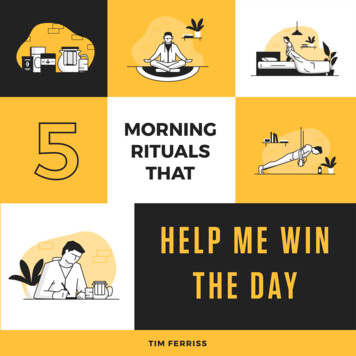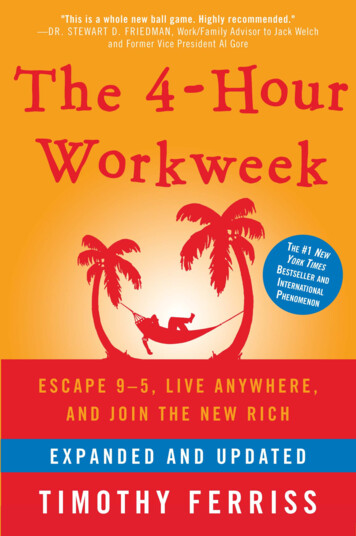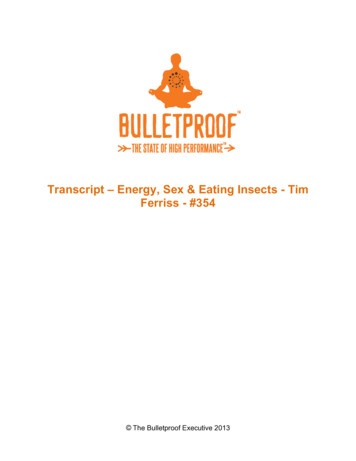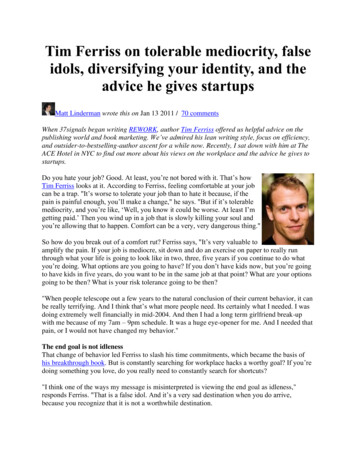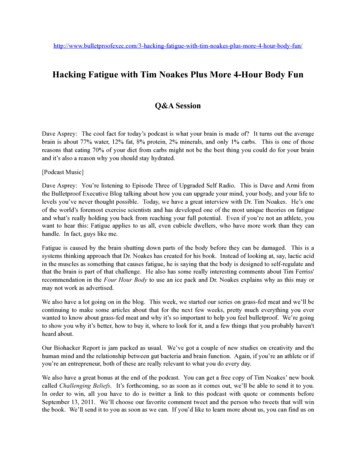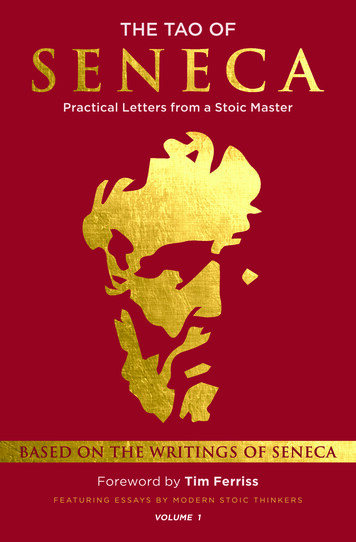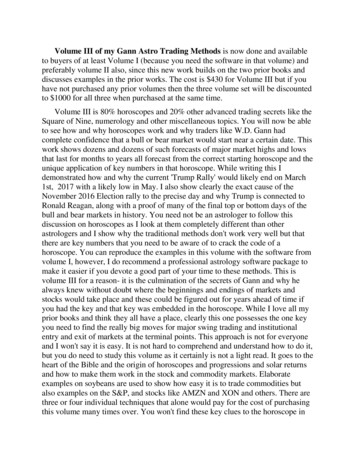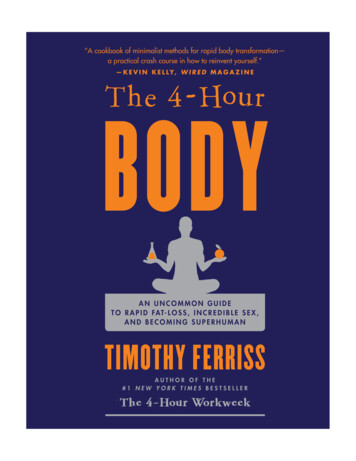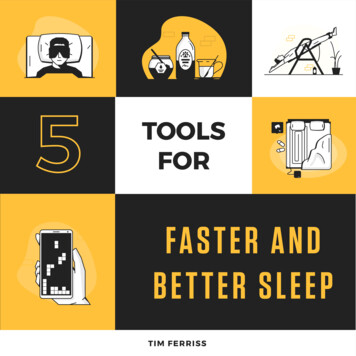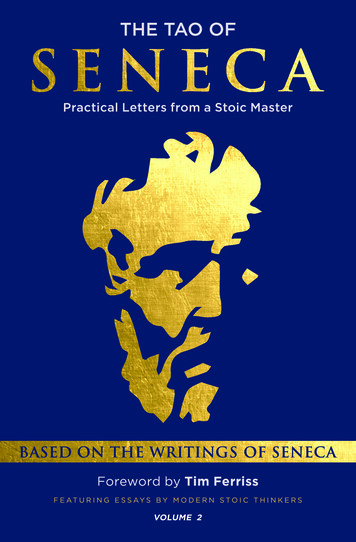
Transcription
VOLUME 2
VOLUME 2
The Tao of Seneca, Volume 2Based on the Moral Letters to Lucilius by Seneca,translated by Richard Mott Gummere.Loeb Classical Library editionVolume 1 first published 1917;Volume 2 first published in 1920;Volume 3 first published 1925.Loeb Classical Library is a registered trademark ofThe President and Fellows of Harvard College.Front Cover Design by FivestarBranding (www.fivestarlogo.com)Book Interior Design and Typography by Laurie Griffin(www.lauriegriffindesign.com)Printed in U.S.A.
THESE VOLUMES ARE DEDICATEDTO ALL WHO SEEK TO BETTERTHEMSELVES AND, IN DOING SO,BETTER THE WORLD.—Tim Ferriss
TABL E OF CON T E N TSLETTER 66On Various Aspects of VirtueLETTER 67On Ill-Health and Endurance of Suffering25Massimo Pigliucci30THOUGHTS FROM MODERN STOICS:9LETTER 68On Wisdom and Retirement36LETTER 69On Rest and Restlessness41LETTER 70On the Proper Time to Slip the Cable43LETTER 71On the Supreme Good52LETTER 72On Business as the Enemy of Philosophy64LETTER 73On Philosophers and Kings69LETTER 74On Virtue as a Refuge From Worldly Distractions74LETTER 75On the Diseases of the Soul86LETTER 76On Learning Wisdom in Old Age93LETTER 77On Taking One’s Own LifeLETTER 78On the Healing Power of the MindLETTER 79On the Rewards of Scientific Discovery120LETTER 80On Worldly Deceptions127LETTER 81On Benefits131LETTER 82On the Natural Fear of Death142LETTER 83On Drunkenness152THOUGHTS FROM MODERN STOICS:William B. Irvine104111161LETTER 84On Gathering Ideas162LETTER 85On Some Vain Syllogisms167LETTER 86On Scipio’s Villa180LETTER 87Some Arguments in Favour of the Simple Life187LETTER 88On Liberal and Vocational Studies201LETTER 89On the Parts of Philosophy217THOUGHTS FROM MODERN STOICS:Massimo Pigliucci226
LETTER 90 Onthe Part Played by Philosophyin the Progress of Man235LETTER 91 OnLETTER 92the Lesson to be DrawnFrom the Burning of Lyons253On the Happy Life263LETTER 93 Onthe Quality, as Contrasted Withthe Length, of Life279Profiles of Modern-Day Stoics From Tools of Titans:Tony Robbins, Chris Sacca, Amelia Boone285
SUG G E ST EDS HO RT RE A D I N GAIf you ever feel overwhelmed by longer reads in this book, beloware a few 5–10-minute options that punch above their weight.Each of these blog posts explores how to apply practical philosophies in the real world, and the first is the most importantto me personally:Fear-Setting: The Most Valuable Exercise I Do Every Month(tim.blog/fear-setting)Stoicism 101: A Practical Guide for Entrepreneurs(tim.blog/stoicism101)On The Shortness of Life: An Introduction to Seneca(tim.blog/shortness)How to Use Philosophy as a Personal Operating System:From Seneca to Musashi(tim.blog/philosophy)Discovering Kindness In The Storm(tim.blog/kindness)Stoicism for Modern Stresses: 5 Lessons from Cato(tim.blog/less-stress)
Japanese: Shiki Soku Ze KuEnglish: Taken together, Shiki Soku Ze Ku suggests thatcolor (a metaphor for form) is empty. Total meaning: form isemptiness, a common phrase in Buddhist teaching.(Read vertically from top right to bottom left.Each character is one word above.)Calligrapher: Noriko Lake
LETTER 66On Various Aspects of VirtueAI have just seen my former school-mate Claranus for the first timein many years. You need not wait for me to add that he is an oldman; but I assure you that I found him hale in spirit and sturdy,although he is wrestling with a frail and feeble body. For Natureacted unfairly when she gave him a poor domicile for so rare asoul; or perhaps it was because she wished to prove to us that anabsolutely strong and happy mind can lie hidden under any exterior. Be that as it may, Claranus overcomes all these hindrances,and by despising his own body has arrived at a stage where hecan despise other things also.The poet who sangWorth shows more pleasing in a form that’s fair,[1]is, in my opinion, mistaken. For virtue needs nothing to set it off;it is its own great glory, and it hallows the body in which it dwells.At any rate, I have begun to regard Claranus in a different light;he seems to me handsome, and as well-setup in body as in mind.A great man can spring from a hovel; so can a beautiful andgreat soul from an ugly and insignificant body. For this reasonNature seems to me to breed certain men of this stamp with theidea of proving that virtue springs into birth in any place whatever. Had it been possible for her to produce souls by themselves
10THE TAO OF SENECA VOLUME 2and naked, she would have done so; as it is, Nature does a stillgreater thing, for she produces certain men who, though hampered in their bodies, none the less break through the obstruction.I think Claranus has been produced as a pattern, that we mightbe enabled to understand that the soul is not disfigured by theugliness of the body, but rather the opposite, that the body isbeautified by the comeliness of the soul.Now, though Claranus and I have spent very few days together,we have nevertheless had many conversations, which I will at oncepour forth and pass on to you.The first day we investigated this problem: how can goods beequal if they are of three kinds?[2] For certain of them, according to our philosophical tenets, are primary, such as joy, peace,and the welfare of one’s country. Others are of the second order,moulded in an unhappy material, such as the endurance of suffering, and self-control during severe illness. We shall pray outrightfor the goods of the first class; for the second class we shall prayonly if the need shall arise. There is still a third variety, as, forexample, a modest gait, a calm and honest countenance, and abearing that suits the man of wisdom.Now how can these things be equal when we compare them, ifyou grant that we ought to pray for the one and avoid the other?If we would make distinctions among them, we had better returnto the First Good, and consider what its nature is: the soul thatgazes upon truth, that is skilled in what should be sought andwhat should be avoided, establishing standards of value notaccording to opinion, but according to nature—the soul thatpenetrates the whole world and directs its contemplating gazeupon all its Phenomena, paying strict attention to thoughts andactions, equally great and forceful, superior alike to hardshipsand blandishments, yielding itself to neither extreme of fortune,rising above all blessings and tribulations, absolutely beautiful,
Moral Letters to Lucilius11perfectly equipped with grace as well as with strength, healthyand sinewy,[3] unruffled, undismayed, one which no violence canshatter, one which acts of chance can neither exalt nor depress—asoul like this is virtue itself.There you have its outward appearance, if it should ever comeunder a single view and show itself once in all its completeness.But there are many aspects of it. They unfold themselves according as life varies and as actions differ; but virtue itself does notbecome less or greater.[4] For the Supreme Good cannot diminish,nor may virtue retrograde; rather is it transformed, now into onequality and now into another, shaping itself according to the partwhich it is to play.Whatever it has touched it brings into likeness with itself, anddyes with its own colour. It adorns our actions, our friendships,and sometimes entire households which it has entered and setin order. Whatever it has handled it forthwith makes lovable,notable, admirable.Therefore the power and the greatness of virtue cannot rise togreater heights, because increase is denied to that which is superlatively great. You will find nothing straighter than the straight,nothing truer than the truth, and nothing more temperate thanthat which is temperate.Every virtue is limitless; for limits depend upon definite measurements. Constancy cannot advance further, any more thanfidelity, or truthfulness, or loyalty. What can be added to thatwhich is perfect? Nothing otherwise that was not perfect to whichsomething has been added. Nor can anything be added to virtue,either, for if anything can be added thereto, it must have containeda defect. Honour, also, permits of no addition; for it is honourablebecause of the very qualities which I have mentioned.[5] Whatthen? Do you think that propriety, justice, lawfulness, do not also
12THE TAO OF SENECA VOLUME 2belong to the same type, and that they are kept within fixed limits?The ability to increase is proof that a thing is still imperfect.The good, in every instance, is subject to these same laws.The advantage of the state and that of the individual are yokedtogether; indeed it is as impossible to separate them as to separate the commendable from the desirable. Therefore, virtues aremutually equal; and so are the works of virtue, and all men whoare so fortunate as to possess these virtues.But, since the virtues of plants and of animals are perishable,they are also frail and fleeting and uncertain. They spring up, andthey sink down again, and for this reason they are not rated at thesame value; but to human virtues only one rule applies. For rightreason is single and of but one kind. Nothing is more divine thanthe divine, or more heavenly than the heavenly.Mortal things decay, fall, are worn out, grow up, are exhausted,and replenished. Hence, in their case, in view of the uncertaintyof their lot, there is inequality; but of things divine the nature isone. Reason, however, is nothing else than a portion of the divinespirit set in a human body.[6] If reason is divine, and the good inno case lacks reason, then the good in every case is divine. Andfurthermore, there is no distinction between things divine; hencethere is none between goods, either. Therefore it follows that joyand a brave unyielding endurance of torture are equal goods; forin both there is the same greatness of soul relaxed and cheerfulin the one case, in the other combative and braced for action.What? Do you not think that the virtue of him who bravelystorms the enemy’s stronghold is equal to that of him who enduresa siege with the utmost patience? Great is Scipio when he investsNumantia,[7] and constrains and compels the hands of an enemy,whom he could not conquer, to resort to their own destruction.Great also are the souls of the defenders—men who know that, aslong as the path to death lies open, the blockade is not complete,
Moral Letters to Lucilius13men who breathe their last in the arms of liberty. In like manner,the other virtues are also equal as compared with one another:tranquillity, simplicity, generosity, constancy, equanimity, endurance. For underlying them all is a single virtue—that which renders the soul straight and unswerving.“What then,” you say; “is there no difference between joy andunyielding endurance of pain?” None at all, as regards the virtuesthemselves; very great, however, in the circumstances in whicheither of these two virtues is displayed. In the one case, there is anatural relaxation and loosening of the soul; in the other there isan unnatural pain. Hence these circumstances, between which agreat distinction can be drawn, belong to the category of indifferent things,[8] but the virtue shown in each case is equal.Virtue is not changed by the matter with which it deals; if thematter is hard and stubborn, it does not make the virtue worse;if pleasant and joyous, it does not make it better. Therefore, virtue necessarily remains equal. For, in each case, what is done isdone with equal uprightness, with equal wisdom, and with equalhonour. Hence the states of goodness involved are equal, and itis impossible for a man to transcend these states of goodness byconducting himself better, either the one man in his joy, or theother amid his suffering. And two goods, neither of which canpossibly be better, are equal.For if things which are extrinsic to virtue can either diminishor increase virtue, then that which is honourable[9] ceases to bethe only good. If you grant this, honour has wholly perished. Andwhy? Let me tell you: it is because no act is honourable that isdone by an unwilling agent, that is compulsory. Every honourableact is voluntary. Alloy it with reluctance, complaints, cowardice,or fear, and it loses its best characteristic—self-approval. Thatwhich is not free cannot be honourable; for fear means slavery.
14THE TAO OF SENECA VOLUME 2The honourable is wholly free from anxiety and is calm; if itever objects, laments, or regards anything as an evil, it becomessubject to disturbance and begins to flounder about amid greatconfusion. For on one side the semblance of right calls to it, onthe other the suspicion of evil drags it back, therefore, when a manis about to do something honourable, he should not regard anyobstacles as evils, even though he regard them as inconvenient,but he should will to do the deed, and do it willingly. For everyhonourable act is done without commands or compulsion; it isunalloyed and contains no admixture of evil.I know what you may reply to me at this point: “Are you tryingto make us believe that it does not matter whether a man feelsjoy, or whether he lies upon the rack and tires out his torturer?”I might say in answer: “Epicurus also maintains that the wiseman, though he is being burned in the bull of Phalaris,[10] willcry out: ‘Tis pleasant, and concerns me not at all.’” Why need youwonder, if I maintain that he who reclines at a banquet and thevictim who stoutly withstands torture possess equal goods, whenEpicurus maintains a thing that is harder to believe, namely, thatit is pleasant to be roasted in this way?But the reply which I do make, is that there is great differencebetween joy and pain; if I am asked to choose, I shall seek theformer and avoid the latter. The former is according to nature,the latter contrary to it. So long as they are rated by this standard,there is a great gulf between; but when it comes to a question ofthe virtue involved, the virtue in each case is the same, whetherit comes through joy or through sorrow.Vexation and pain and other inconveniences are of no consequence, for they are overcome by virtue. Just as the brightnessof the sun dims all lesser lights, so virtue, by its own greatness,shatters and overwhelms all pains, annoyances, and wrongs; andwherever its radiance reaches, all lights which shine without the
Moral Letters to Lucilius15help of virtue are extinguished; and inconveniences, when theycome in contact with virtue, play no more important a part thandoes a storm-cloud at sea.This can be proved to you by the fact that the good man willhasten unhesitatingly to any noble deed; even though he be confronted by the hangman, the torturer, and the stake, he will persist, regarding not what he must suffer, but what he must do; andhe will entrust himself as readily to an honourable deed as hewould to a good man; he will consider it advantageous to himself, safe, propitious. And he will hold the same view concerningan honourable deed, even though it be fraught with sorrow andhardship, as concerning a good man who is poor or wasting awayin exile.Come now, contrast a good man who is rolling in wealth witha man who has nothing, except that in himself he has all things;they will be equally good, though they experience unequal fortune. This same standard, as I have remarked, is to be applied tothings as well as to men; virtue is just as praiseworthy if it dwellsin a sound and free body, as in one which is sickly or in bondage.Therefore, as regards your own virtue also, you will not praise itany more, if fortune has favoured it by granting you a sound body,than if fortune has endowed you with a body that is crippled insome member, since that would mean rating a master low becausehe is dressed like a slave. For all those things over which Chanceholds sway are chattels, money, person, position; they are weak,shifting, prone to perish, and of uncertain tenure. On the otherhand, the works of virtue are free and unsubdued, neither moreworthy to be sought when fortune treats them kindly, nor lessworthy when any adversity weighs upon them.Now friendship in the case of men corresponds to desirabilityin the case of things. You would not, I fancy, love a good man ifhe were rich any more than if he were poor, nor would you love
16THE TAO OF SENECA VOLUME 2a strong and muscular person more than one who was slenderand of delicate constitution. Accordingly, neither will you seekor love a good thing that is mirthful and tranquil more than onethat is full of perplexity and toil.Or, if you do this, you will, in the case of two equally good men,care more for him who is neat and well-groomed than for himwho is dirty and unkempt. You would next go so far as to caremore for a good man who is sound in all his limbs and withoutblemish, than for one who is weak or purblind; and gradually yourfastidiousness would reach such a point that, of two equally justand prudent men, you would choose him who has long curlinghair! Whenever the virtue in each one is equal, the inequality intheir other attributes is not apparent. For all other things are notparts, but merely accessories.Would any man judge his children so unfairly as to care morefor a healthy son than for one who was sickly, or for a tall child ofunusual stature more than for one who was short or of middlingheight? Wild beasts show no favouritism among their offspring;they lie down in order to suckle all alike; birds make fair distribution of their food. Ulysses hastens back to the rocks of his Ithacaas eagerly as Agamemnon speeds to the kingly walls of Mycenae.For no man loves his native land because it is great; he loves itbecause it is his own.[11]And what is the purpose of all this? That you may know thatvirtue regards all her works in the same light, as if they were herchildren, showing equal kindness to all, and still deeper kindnessto those which encounter hardships; for even parents lean withmore affection towards those of their offspring for whom they feelpity. Virtue, too, does not necessarily love more deeply those ofher works which she beholds in trouble and under heavy burdens,but, like good parents, she gives them more of her fostering care.
Moral Letters to Lucilius17Why is no good greater than any other good? It is becausenothing can be more fitting than that which is fitting, and nothing more level than that which is level. You cannot say that onething is more equal to a given object than another thing; hencealso nothing is more honourable than that which is honourable.Accordingly, if all the virtues are by nature equal, the threevarieties[12] of goods are equal. This is what I mean: there is anequality between feeling joy with self-control and suffering painwith self-control. The joy in the one case does not surpass in theother the steadfastness of soul that gulps down the groan whenthe victim is in the clutches of the torturer; goods of the first kindare desirable, while those of the second are worthy of admiration;and in each case they are none the less equal, because whateverinconvenience attaches to the latter is compensated by the qualities of the good, which is so much greater.Any man who believes them to be unequal is turning awayfrom the virtues themselves and is surveying mere externals; truegoods have the same weight and the same width.[13] The spurioussort contain much emptiness; hence, when they are weighed inthe balance, they are found wanting, although they look imposingand grand to the gaze.Yes, my dear Lucilius, the good which true reason approvesis solid and everlasting; it strengthens the spirit and exalts it, sothat it will always be on the heights; but those things which arethoughtlessly praised, and are goods in the opinion of the mobmerely puff us up with empty joy. And again, those things whichare feared as if they were evils merely inspire trepidation in men’sminds, for the mind is disturbed by the semblance of danger, justas animals are disturbed.Hence it is without reason that both these things distract andsting the spirit; the one is not worthy of joy, nor the other offear. It is reason alone that is unchangeable, that holds fast to its
18THE TAO OF SENECA VOLUME 2decisions. For reason is not a slave to the senses, but a ruler overthem. Reason is equal to reason, as one straight line to another;therefore virtue also is equal to virtue. Virtue is nothing else thanright reason. All virtues are reasons. Reasons are reasons, if theyare right reasons. If they are right, they are also equal.As reason is, so also are actions; therefore all actions are equal.For since they resemble reason, they also resemble each other.Moreover, I hold that actions are equal to each other in so far asthey are honourable and right actions. There will be, of course,great differences according as the material varies, as it becomesnow broader and now narrower, now glorious and now base, nowmanifold in scope and now limited. However, that which is bestin all these cases is equal; they are all honourable.In the same way, all good men, in so far as they are good, areequal. There are, indeed, differences of age, one is older, anotheryounger; of body—one is comely, another is ugly; of fortune—thisman is rich, that man poor, this one is influential, powerful, andwell-known to cities and peoples, that man is unknown to most,and is obscure. But all, in respect of that wherein they are good,are equal.The senses[14] do not decide upon things good and evil; theydo not know what is useful and what is not useful. They cannotrecord their opinion unless they are brought face to face with afact; they can neither see into the future nor recollect the past;and they do not know what results from what. But it is from suchknowledge that a sequence and succession of actions is woven,and a unity of life is created—a unity which will proceed in astraight course. Reason, therefore, is the judge of good and evil;that which is foreign and external she regards as dross, and thatwhich is neither good nor evil she judges as merely accessory,insignificant and trivial. For all her good resides in the soul.
Moral Letters to Lucilius19But there are certain goods which reason regards as primary,to which she addresses herself purposely; these are, for example,victory, good children, and the welfare of one’s country. Certainothers she regards as secondary; these become manifest only inadversity—for example, equanimity in enduring severe illness orexile. Certain goods are indifferent; these are no more accordingto nature than contrary to nature, as, for example, a discreet gaitand a sedate posture in a chair. For sitting is an act that is not lessaccording to nature than standing or walking.The two kinds of goods which are of a higher order are different; the primary are according to nature—such as deriving joyfrom the dutiful behaviour of one’s children and from the wellbeing of one’s country. The secondary are contrary to nature—such as fortitude in resisting torture or in enduring thirst whenillness makes the vitals feverish.“What then,” you say; “can anything that is contrary to naturebe a good?” Of course not; but that in which this good takes itsrise is sometimes contrary to nature. For being wounded, wastingaway over a fire, being afflicted with bad health—such things arecontrary to nature; but it is in accordance with nature for a manto preserve an indomitable soul amid such distresses.To explain my thought briefly, the material with which a goodis concerned is sometimes contrary to nature, but a good itselfnever is contrary, since no good is without reason, and reason isin accordance with nature.“What, then,” you ask, “is reason?” It is copying nature.[15] “Andwhat,” you say, “is the greatest good that man can possess?” It isto conduct oneself according to what nature wills.“There is no doubt,” says the objector, “that peace affords morehappiness when it has not been assailed than when it has beenrecovered at the cost of great slaughter.” “There is no doubt also,”he continues, “that health which has not been impaired affords
20THE TAO OF SENECA VOLUME 2more happiness than health which has been restored to soundnessby means of force, as it were, and by endurance of suffering, afterserious illnesses that threaten life itself. And similarly there will beno doubt that joy is a greater good than a soul’s struggle to endureto the bitter end the torments of wounds or burning at the stake.”By no means. For things that result from hazard admit of widedistinctions, since they are rated according to their usefulness inthe eyes of those who experience them, but with regard to goods,the only point to be considered is that they are in agreementwith nature; and this is equal in the case of all goods. When at ameeting of the Senate we vote in favour of someone’s motion, itcannot be said, “A. is more in accord with the motion than B.” Allalike vote for the same motion. I make the same statement withregard to virtues—they are all in accord with nature; and I makeit with regard to goods also—they are all in accord with nature.One man dies young, another in old age, and still another ininfancy, having enjoyed nothing more than a mere glimpse outinto life. They have all been equally subject to death, even thoughdeath has permitted the one to proceed farther along the pathway of life, has cut off the life of the second in his flower, and hasbroken off the life of the third at its very beginning.Some get their release at the dinner-table. Others extend theirsleep into the sleep of death. Some are blotted out during dissipation.[16] Now contrast with these persons individuals whohave been pierced by the sword, or bitten to death by snakes, orcrushed in ruins, or tortured piecemeal out of existence by theprolonged twisting of their sinews. Some of these departures maybe regarded as better, some as worse; but the act of dying is equalin all. The methods of ending life are different; but the end is oneand the same. Death has no degrees of greater or less; for it hasthe same limit in all instances—the finishing of life.
Moral Letters to Lucilius21The same thing holds true, I assure you, concerning goods; youwill find one amid circumstances of pure pleasure, another amidsorrow and bitterness. The one controls the favours of fortune; theother overcomes her onslaughts. Each is equally a good, althoughthe one travels a level and easy road, and the other a rough road.And the end of them all is the same—they are goods, they areworthy of praise, they accompany virtue and reason. Virtue makesall the things that it acknowledges equal to one another.You need not wonder that this is one of our principles; we findmentioned in the works of Epicurus[17] two goods, of which hisSupreme Good, or blessedness, is composed, namely, a body freefrom pain and a soul free from disturbance. These goods, if theyare complete, do not increase; for how can that which is complete increase? The body is, let us suppose, free from pain; whatincrease can there be to this absence of pain? The soul is composed and calm; what increase can there be to this tranquillity?Just as fair weather, purified into the purest brilliancy, does notadmit of a still greater degree of clearness; so, when a man takescare of his body and of his soul, weaving the texture of his goodfrom both, his condition is perfect, and he has found the consummation of his prayers, if there is no commotion in his soul or painin his body. Whatever delights fall to his lot over and above thesetwo things do not increase his Supreme Good; they merely seasonit, so to speak, and add spice to it. For the absolute good of man’snature is satisfied with peace in the body and peace in the soul.I can show you at this moment in the writings of Epicurus[18] agraded list of goods just like that of our own school. For there aresome things, he declares, which he prefers should fall to his lot,such as bodily rest free from all inconvenience, and relaxation ofthe soul as it takes delight in the contemplation of its own goods.And there are other things which, though he would prefer thatthey did not happen, he nevertheless praises and approves, for
22THE TAO OF SENECA VOLUME 2example, the kind of resignation, in times of ill-health and serioussuffering, to which I alluded a moment ago, and which Epicurusdisplayed on that last and most blessed day of his life. For he tellsus[19] that he had to endure excruciating agony from a diseasedbladder and from an ulcerated stomach, so acute that it permittedno increase of pain; “and yet,” he says, “that day was none the lesshappy.” And no man can spend such a day in happiness unless hepossesses the Supreme Good.We therefore find mentioned, even by Epicurus,[20] thosegoods which one would prefer not to experience; which, however, because circumstances have decided thus, must be welcomedand approved and placed on a level with the highest goods. Wecannot say that the good which has rounded out[21] a happy life,the good for which Epicurus rendered thanks in the last wordshe uttered, is not equal to the greatest.Allow me, excellent Lucilius, to utter a still bolder word: if anygoods could be greater than others, I should prefer those whichseem harsh to those which are mild and alluring, and shouldpronounce them greater. For it is more of an accomplishmentto break one’s way through difficulties than to keep joy withinbounds.It requires the same use of reason, I am fully aware, for a manto endure prosperity well and also to endure misfortune bravely.What man may be just as brave who sleeps in front of the rampartswithout fear of danger when no enemy attacks the camp, as theman who, when the tendons of his legs have been severed, holdshimself up on his knees and does not let fall his weapons; but itis to the blood-stained soldier returning from the front that mencry: “Well done, thou hero!”[22] And therefore I should bestowgreater praise upon those goods that have stood trial and showcourage, and have fought it out with fortune.
Moral Letters to Lucilius23Should I
TABLE OF CONTENTS LETTER 66 On Various Aspects of Virtue 9 LETTER 67 On Ill-Health and Endurance of Suffering 25 THOUGHTS FROM MODERN STOICS: Massimo Pigliucci 30 LETTER 68 On Wisdom and Retirement 36 LETTER 69 On Rest and Restlessness 41 LETTER 70 On the Proper Time to Slip the Cable 43 LETTER 71 On the Supreme Good 52 LETTER 72 On Business as the Enemy of Philosophy 64
